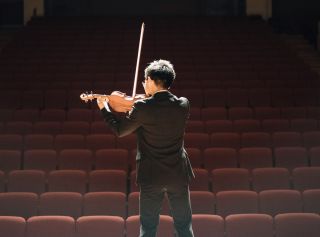Stage Fright
The Psychophysiology of Music Performance Anxiety
Fortunately, the mind-body connection starts in the mind, even on stage.
Posted May 10, 2024 Reviewed by Ray Parker
Key points
- Because performance anxiety is a complex problem, it requires a multifaceted explanation.
- Musicians will likely feel anxiety if they perceive performance as a threat rather than a challenge.
- Musicians should choose valued self-relevant performance tasks for themselves and approach them realistically.
Because performance anxiety can be such a complex and persistent problem for musicians, it’s no wonder that many performers are drawn to simple explanations and easy solutions. Unfortunately, just as there is no miracle cure for complex issues like addiction or depression, there is no single strategy that will allow every musician to overcome struggles with stage fright. Because performance anxiety is multifaceted, a psychophysiological approach would seem to hold promise. As a discipline, psychophysiology considers the relationship between physiological functions as the study of the relationship between the physiological functions of the body and the cognitive and emotional processes of the mind.
A better understanding of performance anxiety usually begins with consideration of the hyperarousal response of the body’s autonomic nervous system, more commonly known as the fight-or-flight mechanism. This physiological response, in which a powerful burst of adrenaline is released into the bloodstream, is triggered when a person perceives a threat. When the threat is real—say, the appearance of a predatory, wild animal—then the fight-or-flight response is adaptive: it can provide the best chance of survival. If, however, the perceived threat is not actually life-threatening, the physiological response is experienced as bothersome or even debilitating.

Many musicians will want to reject the implication that they consider their music making a life-endangering threat. But it is not so easy to dismiss the evidence, the trembling, excessive sweating, shortness of breath, and other incapacitating symptoms of anxiety. Stage fright sufferers should think long and hard about why they feel threatened by music performance, which is, presumably, an activity that they choose to do.
One prominent model for understanding performing anxiety is the biopsychosocial (BPS) model, which explains physiological symptoms resulting from bodily physical factors, psychological factors, and social factors. The BPS indicates that people engage in performance situations “in order to attain valued self-relevant goals” (Gunyon et al., 2020, p. 2). Further, a performance task is perceived as a challenge when performers judge their resources (e.g., skills, strategies) to meet or exceed the demands of the task. If, however, the demands of the task are judged to exceed their resources, then people perceive the task to be a threat.
Even the basics of the biopsychosocial model (presented above) suggest areas for performing musicians to carry out self-examination when trying to manage performance anxiety. First, musicians should strive to make their performance activities personally meaningful and important to them (i.e., valued and self-relevant). Performers who develop their skills through formal music instruction often find themselves exclusively carrying out performances that have been assigned to them by teachers or are otherwise expected by others. Lacking a sense of autonomy in one’s own performance activities produces a type of motivation that makes performers especially susceptible to stage fright.
Also, the biopsychosocial model indicates that individuals can experience a performance task as either a challenge or a threat. The determining factor is how a performer self-appraises the “resources” they possess to accomplish the task. This idea, of course, hearkens back to the prominent motivational theory of self-efficacy, which asserts that individuals’ subjective judgments about their abilities are a primary determinant of achievement in a particular performance domain (Bandura, 1986). The biopsychosocial model expands on this to suggest that if a performer’s self-efficacy is such that they believe the demands of a particular task exceed what they are equipped to do, then they will view the task as a threat and experience the symptoms of anxiety.
This idea also reinforces aspects of Mihaly Csikszentmihalyi’s (1990) theory of flow. This immersive state of optimal enjoyment can be experienced by performers in a challenging task when they possess the skills required by the task. Most musicians like to take on challenges to advance their musicianship to make greater accomplishments possible in the future. It is a beneficial approach to take on performance challenges that will push their abilities, but such challenges must also be realistic, meaning that they have the resources (including motivation) available to them to meet the demands of the challenge. Then as they practice and prepare for the performance ahead, they can do so looking forward to walking on stage to face the challenge amply equipped and expect to hold up well or even enjoy the performance experience. It appears that the rewarding indicators of flow (challenge) decrease as the debilitating symptoms of performance anxiety (threat) increase (Runyon et al., 2022).
Finally, note the general idea that underlies the choosing of realistic challenges and being able to trust your perception of a threat. Making progress in managing performance anxiety seems to require a certain rationality and levelheadedness. At most music performances, the audience members have chosen to attend and want to enjoy the music. In this way, they are predisposed to think favorably of the performers on stage in front of them. Thus, if the musicians take that stage believing that the people in the audience are there to judge them harshly, then they are not appraising the performance situation realistically. Similarly, if musicians allow their thoughts to stray from the truth that they are well prepared and instead become preoccupied with the possibility of utterly failing on stage (i.e., “catastrophizing”), then, again, they have departed from the reality of the situation and are misperceiving the performance as a threat.
Musicians may not be able to control all aspects of a performance task or even the extent that it is self-relevant. After all, sometimes they take gigs just for the paycheck or to help another person out, and the performance may not turn out to be very personally or artistically rewarding. They can, however, exercise control over their own thinking. Again, recall that the body’s fight-or-flight stress response is triggered by a perceived threat. So, even if performers cannot change aspects of performance that they do not like, they can still work on their perception of those performance aspects. Often, choosing to cognitively dwell on the reality of your own preparedness rather than on any possible negative aspects is the most effective way to eliminate threats and curb the physiological symptoms of performance anxiety.
References
Bandura, A. (1986). Social foundations of thought and action: A social cognitive theory. Englewood Cliffs, NJ: Prentice-Hall.
Csikszentmihalyi, M. (1990). Flow: The psychology of optimal experience. New York: Harper and Row.
Guyon, A. J., Studer, R. K., Hildebrandt, H., Horsch, A., Nater, U. M., & Gomez, P. (2020). Music performance anxiety from the challenge and threat perspective: psychophysiological and performance outcomes. BMC Psychology, 8, 1-13.
Guyon, A. J., Hildebrandt, H., Güsewell, A., Horsch, A., Nater, U. M., & Gomez, P. (2022). How audience and general music performance anxiety affect classical music students’ flow experience: a close look at its dimensions. Frontiers in Psychology, 13, 959190.


